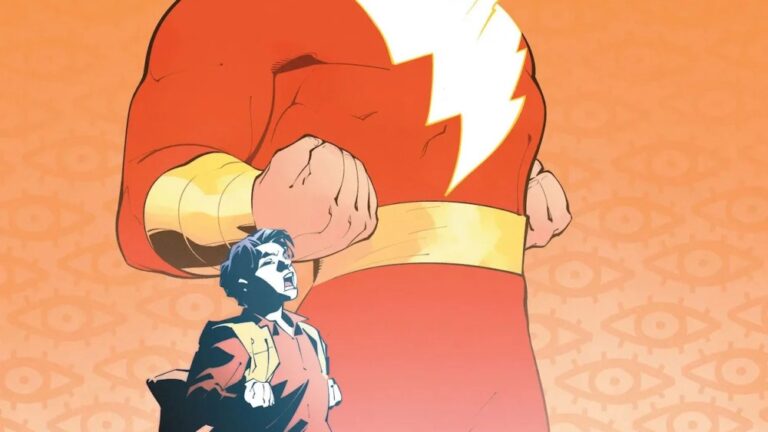“The world needs a champion. A champion of the lost, the forgotten. Can you protect the Earth from evildoers and keep their tools of evil trapped in rock forever? If so, say the word.”
In Shazam! #15, Philadelphia sinks and monsters emerge from beneath the streets. Meanwhile, Billy Batson tries to rediscover his purpose and Freddy Freeman desperately tries to escape a new artistic foe. Mary Marvel and Uncle Dudley team up with Tawkey Tawney and the rest of their siblings to hold off hordes of invading Sub-Men. This may be the final installment of “Where’s Billy Batson?”, but there’s enough developments to promise the story isn’t over yet.
Josie Campbell and Emanuela Lupaccino, with the help of coloring by Trish Mulvihill, deliver another fun adventure for Shazamly that tries to focus on what it means to use the power of magic words. And how they execute it makes this issue in particular feel like a defining moment for both Billy and Freddy. But it’s worth noting that the fascinating contrast between Billy’s growth stemming from self-discovery, while Freddy’s motivations stem from despair and inadequacy, will definitely be interesting to explore in the near future.
DC Comics
This issue’s greatest strength is how it evolves the thematic narrative, especially as it calls back to the first arc without feeling like it relied on understanding that story to get its point across, as in previous issues. The prominent theme here boils down to how people who were thought to be infallible can still fail in their duties, and that experience defines the gods as much as their powers. The presence of these gods feels like a natural continuation of what’s been covered so far, but its presence is limited by the fact that this is the final episode and there’s a lot else going on, as the focus is on making this third act battle as big and fun as the premise allows.
Now, there may be a lot going on in this issue, and while it’s not really detrimental, the story does lose a bit of focus as a result. And while Billy’s personal journey does indeed come to a strong conclusion at the end, things get revealed quickly, despite being relatively well-rounded. King Kull’s story in particular ends abruptly, albeit satisfyingly. Despite the ending leaving some unanswered questions, the final few pages give the creators a sense of confidence that they’re just getting started.
As mentioned before, Lupacino continues to deliver very enjoyable art that is more consistently psychedelic than his last few works, but as mentioned before, it lacks focus amidst the chaos and there aren’t many special moments where the visuals really shine. While consistency isn’t an issue per se, it does leave a bit to be desired if you want a page that will stick with the reader beyond the final page, which goes without saying is a great page that shows how things have been building up.
Overall, Shazam! #15 is an emotionally satisfying finale, but admittedly held back by an inability to linger on key moments throughout as we move forward with the next storyline. As a result, it’s over-the-top and energetic compared to Campbell and Lupaccino’s previous work. Nevertheless, the emotional core is very resonant and will undoubtedly be rewarding for readers who have followed the series since its inception, and may become even more so as further developments unfold.
Shazam! #15 makes the family feel a little bigger
Shazam! #15
It’s an emotionally satisfying final chapter, but I have to admit it’s a bit sluggish, not being able to sustain any long stretches of key moments throughout, as we set up for the next chapter.
Billy’s story since his feud with the Gods has finally concluded in a very rewarding way.
Freddie is in a great position for further development.
The whole family, especially the returning characters, feel right at home without having to overly justify their presence.
The way the scale is presented makes the book feel larger, despite the presence of Earthly threats, compared to gods, moon emperors, and space dinosaurs.
Unfortunately, the chaotic nature of this one caused the book to lose some of its focus on big moments throughout compared to previous issues.
Points are often passed too quickly, despite the idea being one that should at least be discussed at a bit longer, resulting in abruptness.


